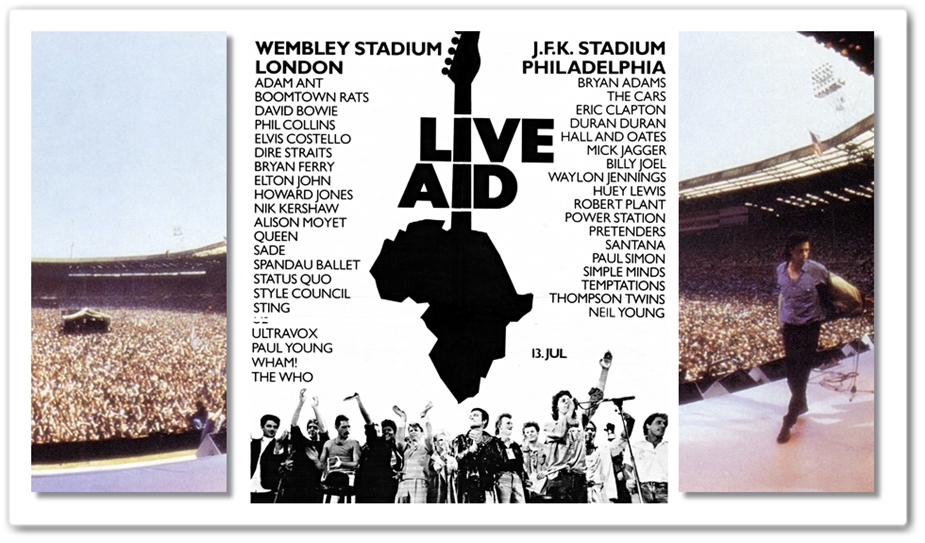Live Aid has been called my generation’s Woodstock — Joan Baez herself made the comparison when she took the stage in Philadelphia to kick off the U.S. half of the show — but I wonder if the globe-spanning charity concert really had that same level of cultural impact. I suspect the name “Woodstock” would still mean something to kids today, two generations removed from that epochal event, but would those same kids recognize the words “Live Aid?” I just don’t know. As big a deal as it was at the time, I haven’t heard much about it in the intervening years, at least not until today, its 30th anniversary.
Ah, but thirty years ago today, I was fifteen years old, and Live Aid was just about the coolest thing that I’d ever seen, aside from Star Wars and the space shuttle: a day-long concert taking place simultaneously in two separate venues on two different continents, broadcast live on multiple television networks to a globe-spanning audience of over a billion people, all in the name of charity. I didn’t watch all sixteen hours of it, of course. As I recall, the TV was on all day while I was in and out of the room, going about my lazy summertime routines, and I would stop from time to time when one act or another caught my attention. But even though I wasn’t giving it my full attention, just having the event playing in the background made me feel as if I were… connected… a participant in something of tremendous significance, something bigger than myself. I was a witness to history. Or so it seemed at the time. It could that I was just a 15-year-old music fan who was blown away by the line-up of stars marching across the stages in London and Philadelphia. You can see some of them in the poster above, although that’s not a comprehensive listing. Basically, anyone who was anyone was there, either at Wembley or JFK Stadium.
My main man Rick Springfield, for example:
And then there was Phil Collins, who appeared on both stages, thanks to a supersonic hop across the pond aboard the late, lamented Concorde:
Yes, the ’80s were a very different time, and a lot more things seemed possible then. Even a Led Zeppelin reunion, probably the highlight of the whole day for me:
The mighty Zep had disbanded only five years before Live Aid, but this reunion performance nevertheless felt like something that had been a long time coming, as if the gods of legend had returned briefly from Olympus long enough to remind we puny mortals that the Earth had once been theirs, before vanishing again into realms beyond our ken. The fact that their performance was widely panned by the critics, and even by the surviving band members themselves (who refused to allow its inclusion in the official DVD set released a while back because they’re embarrassed by it), didn’t change the momentous atmosphere that surrounded it.
And that, I suppose, is a handy metaphor for the entire event. Looking back at Live Aid across a chasm of thirty years, I honestly have no idea whether it ultimately mattered, or did anything to help the people it was supposed to help. But at the time, we believed it would help. We really did, all of us who watched. And that was what made Live Aid such a big deal. That simple, naive faith that the world could be united by music to do something good felt… momentous. Sadly, though, it was fleeting. I can’t imagine a similar event happening today, for a lot of different reasons, but mostly because people just don’t have the right attitudes anymore. It’s not that we no longer feel compassion, but rather because, as a society, we just don’t have the same optimism we did then. About anything. So in that regard, I guess I really was a part of a historic event… or at least, of history. Because while it’s difficult to believe 30 years have passed, that optimistic world of 1985 seems as remote to me now as the one where men wore powdered wigs and velvet breeches.
Oh, wait. They did that in the 1980s, didn’t they? Some of them, anyhow. Well, you know what I mean…


